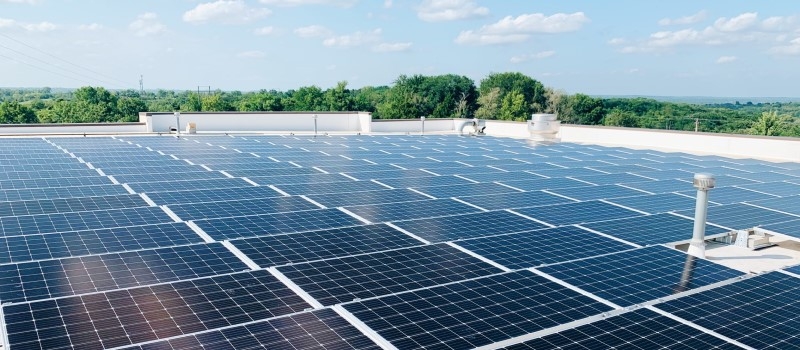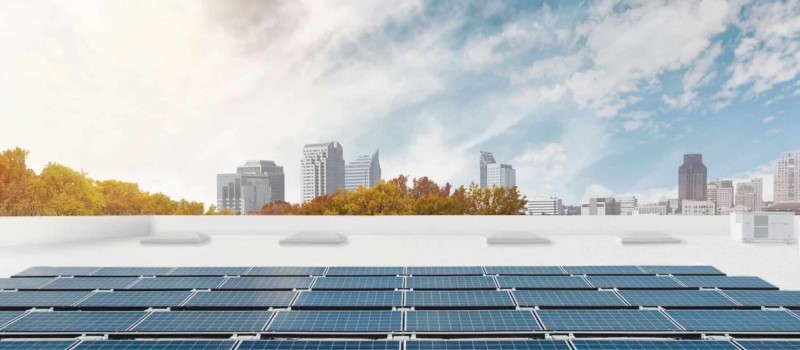With the increasing global emphasis on environmental protection and renewable energy, solar energy, as a clean and sustainable energy situation, has been widely used in many fields such as industry, agriculture and commerce.
Taking the commercial field as an example, corporate plants are usually characterized by large roof areas, flat roofs, less shading, high own power consumption, high electricity prices, etc., which are very suitable for suitable for the installation of solar panels as well as the entire photovoltaic power generation system. Commercial photovoltaic power stations are not restricted by the geographical distribution of resources, and utilize the idle resources of building roofs without noise and pollution. In this blog, we will discuss the top 10 advantages of solar energy in commercial buildings.

-
Energy Saving and Emission Reduction
commercial buildings usually require a large amount of electricity supply, and solar energy is a clean, renewable energy source. By using solar power, commercial buildings can reduce their dependence on traditional energy sources, which in turn reduces carbon emissions and other harmful emissions and has a smaller impact on the environment.
-
Reduced Energy Costs
Energy costs for commercial buildings typically account for a significant percentage of a business's operating expenses. Solar energy utilizes free energy from sunlight to generate electricity, so commercial buildings can significantly reduce energy costs. While the initial investment in a solar energy system may be high, over time, solar energy systems can generate a long-term financial return.
-
Long-Term Return on Investment
Commercial buildings can realize a long-term return on investment by installing a solar energy system. Solar systems typically have a lifespan of 20 to 30 years or more and have low maintenance costs. Commercial buildings can earn revenue by selling electricity to the grid or use the solar energy they generate to meet their internal energy needs, reducing the cost of purchasing electricity.
-
Increase Building Value
Installing a solar power system can increase the value of a commercial building. Solar systems are viewed as a sustainable and environmentally friendly feature, which is appealing to the growing number of environmentally concerned buyers and tenants. Studies have shown that commercial buildings with solar systems typically have a higher market value than those without.
-
Reinforces Corporate Image
The use of solar energy in commercial buildings can enhance a company's sustainable image. Environmentally friendly and energy-efficient practices can attract more consumers and investors, enhancing a company's reputation and image. This green image can increase brand recognition and stand out in a competitive market.

-
Reliability and Stability
The components of a PV system (e.g. PV connectors) usually have a long lifespan and work consistently and reliably. Installing a solar system on a commercial building can result in a long-lasting power supply and lower costs for maintenance and repairs. In contrast, relying on traditional energy supplies can be subject to power interruptions, price fluctuations and other issues.
-
Social Responsibility and Sustainability
The use of solar energy in commercial buildings can demonstrate a company's sense of social responsibility and sustainability. As a renewable energy source, solar energy reduces the consumption of finite resources and minimizes the negative impact on the environment. This environmentally friendly practice can fulfill the expectations of various stakeholders regarding corporate ethics and social responsibility.
-
Policy Support and Incentives
Many governments offer incentives and policy support for the installation of solar energy systems. For example, policies that provide tax credits, subsidies and incentives can reduce the cost of installing solar systems in commercial buildings and encourage more businesses to adopt solar technology.
-
Provide Employment Opportunities
The growth of the solar energy industry provides additional employment opportunities in commercial buildings. Installing, maintaining and managing solar energy systems requires specialized skills and human resources, which creates jobs and promotes economic growth in local communities.
-
Integration into Industry Trends
Solar energy is widely recognized as one of the future trends in energy development. The use of solar energy systems in commercial buildings allows businesses to stay ahead of the curve and adapt to the ever-changing energy industry. This can increase the competitiveness of a business and set the stage for a sustainable future.
To summarize, the use of solar energy in commercial buildings can bring many benefits, and through solar energy, commercial businesses can reduce energy costs, reduce environmental pollution, and gain a long-term return on investment. Currently, solar energy has the potential to become an important part of sustainable and green operations in commercial buildings. As solar technology continues to advance and costs fall further, it is believed that solar energy will play an even greater role in the commercial sector in the future. If you want to buy a complete portable solar power system, or if you just want to learn more about solar energy, visit PowerHome and we will provide the services you want.
(1).png)
(1).png)